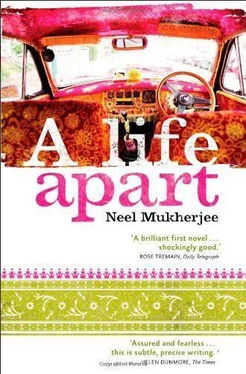Someone had managed to switch on the CD player upstairs without the help of Mrs Haq. The garish Hindi film song, all overblown strings and a superfluous flute, flooded down. Every word of the shrill female voice was audible: A ring on my finger, a serpent in the ring . Mrs Haq ran upstairs. There was the sound of a rapid stream of Urdu and English, a brief wail, a thud and then the abrupt end of the song. When Mrs Haq came down to the living room again, the younger of the two girls was with her. She had put on a headband and some glass bangles. She stayed nestled against her mother but couldn’t take her eyes off Ritwik. Mrs Haq started saying something about her children when Mr Haq, bluff, portly and garrulous, walked in. The girl immediately switched allegiances and jumped on her father, who scooped her up, all the time keeping up his bonhomie talk.
‘Ah, so you’re new boy, heh heh heh, we are curious about you. We find out as soon as you come here, someone from our part of the world is here to look after Mrs Cameron. You’re from Pakistan, no?’
Ritwik hesitated before he said, ‘Well, very close. India.’ He didn’t know why that question made him so defensive.
There was a brief blink before he launched into his camaraderie again. ‘India. India. Well. We’re neighbours. Practically the same country, no? Before they divided us, we were same, all together, Hindu Muslim living as brothers.’ He got more and more animated during the course of his benign politics. ‘Yes, we live in harmony. We live here in harmony if we can’t live there. We are still brothers.’ He extended his hand to Ritwik. As Ritwik shook it, Mr Haq chuckled and said, ‘And you are young enough to be my little brother, no? Heh heh heh.’
In the course of the next hour, in between glasses of tangy and sweet nimbu-paani brought in at regular intervals by Mrs Haq, who had disappeared into the innards of the house on the arrival of her husband, perhaps on kitchen duty, Ritwik was given a filleted history of the Haq family. Mr Haq’s father came to England in the early 60s, as part of a wave of subcontinent immigrants England was opening its doors to at the time, partly to salve its colonial guilt, partly to fill its depleting labour market for the jobs the natives wouldn’t touch. His father had been a young boy when the partition of 1947 had unrooted the poor cobbler family in Aligarh. It had taken them two years to reach Pakistan, the new Muslim homeland, along with millions of other Muslim families who had made the journey to a new home, new hopes, to the company of equals in faith. But everything had turned sour in the new country. Yes, true, there was no danger of their village getting torched by Hindus on the rampage, but Sindh and Baluchistan were arid dustbowls, Karachi a collection of ragged slums. There were no jobs, no food, just swarms of refugees trying to build homes. When Mr Haq’s father was invited by a distant uncle to help him out in his grocery store in Leicester, the family had pinned all hopes on the twenty-one-year-old and borrowed money to put the young man aboard a ship and send him off to a country full of possibilities. He left his wife and their year-old son behind in his village and sailed away.
The young man had done well. By the time he was twenty-seven, he was managing the original store in Leicester, while his uncle had opened two others. Business was good, the Asian community in Leicester was booming and the demand for goods from home was on a dizzyingly upward curve. Mr Haq’s father and his uncle rode it. And compared with the price they paid for the goods brought over from Pakistan, even a 100 per cent mark-up meant that the things they imported and sold in their shops were nearly three times cheaper than native English goods. A child could realize that the pound-rupee exchange rate worked heavily in their favour but it required a certain amount of business nous to exploit that to their full advantage. The young man learnt, hands on, the meaning of profit; Zulfikar Haq became a partner with his uncle. The first time he went back, in 1967, his son Shahid was seven years old. He distributed gifts among the family — razor blades, soaps, plastic toys for the children, shirts, a watch for his ageing father, all from England, to show that he had made it and his family wouldn’t want for anything any more — and returned to England after three months, promising he would come back every year. He didn’t manage to go back every year; the booming business made it more like every three, but he regularly sent money orders and drafts back home. Once again, the rupee-pound exchange kept him a winner.
In the next ten years, Zulfikar Haq and his uncle cracked export licences, cheap sourcing from Pakistan, ship and land delivery, local transport, warehouse logistics, networks of traders from India and Pakistan and, above all, the unarticulated need of an immigrant community to create a little home on foreign soil. They set up the first cash and carry shop in East London in 1970, the year Zulfikar’s uncle died, three months after the inauguration of ‘Manzil Cash and Carry: For Best Products and Cheapest Value’, leaving him in charge of everything. Zulfikar moved to London, delegating the little empire of shops in Leicester and Birmingham, now all his, to a loosely knit assortment of relatives and friends, and travelled to Pakistan to bring back Shahid, now thirteen, to England. He had made it here so he was now going to bring his family over from Pakistan — his wife, whom he had seen only four times since they got married, his three children, Shahid, Salma and Nilufer — and have them ensconced permanently in the good life.
Sitting on his sofa and sipping his wife’s lemonade, Shahid Haq told this rags-to-riches story with evident pride, even with a gentle urge to Ritwik that he should learn from this example and do something worthwhile with his life. Or maybe Ritwik imagined that.
‘I work for my father. Father says school and university, all useless. Look at him. He didn’t have much learning but he was successful’ — Ritwik noted the ‘was’ and wondered if the entrepreneur father was no longer alive but Mr Haq’s tenses were not conservative — ‘He brought me over to help him in business and then, one day, inshallah , take over from him when he gets old. That is what sons are for, to take care of their parents.’
Ritwik did some quick arithmetic: Mr Haq would be in his early to mid-thirties now, although he looked a good ten years older with his greying hair and the paunch overhanging his belt. Zulfikar Haq would be about fifty-five.
‘Where is your father now?’ Ritwik asked abruptly.
‘They go back to Pakistan, my parents. They build big house in Lahore. They go back because they say they want to die in their homeland. The house has become quiet since they left. They want to be with their grandchildren but I tell them, we go back every year to visit them, so they know we’re well with Allah’s blessing.’
Then Mr Haq, with a sudden narrative pirouette, launched into talk about his business: the chain of cash and carry stores, twelve in total, almost all of them delegated to a team of store managers, all of them Pakistani, trained hands-on in the job; how he had sold off the string of cornershops and larger Asian stores in the Midlands to other businessmen and begun to dedicate himself totally to his London ventures; how with increasing profits and enormous growth of the business, the responsibilities, the workload, the nitty-gritty of management, everything had become staggeringly, dauntingly large.
It wasn’t really a hook, but Ritwik decided to use it as one; now or never . ‘It seems the business has grown too vast for you to run it all yourself. You must need a considerable amount of paid help in the less important aspect of things. Don’t you?’
Читать дальше












